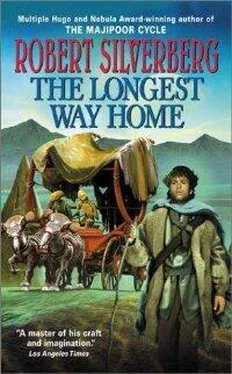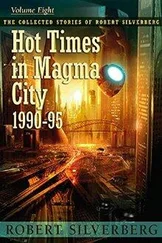That meant, of course, leaving himself open to discovery while he slept. The idea of simply settling down in bright daylight, unconcealed, stretched out asleep beneath some tree where he could be come upon unawares by any passing farmer or poacher or, perhaps, sentry, seemed far too risky to him. He would have liked to find a cave of some sort and crawl into it for a few hours. But there were no caves in sight and he had neither the will nor the means, just now, to dig a hole for himself. And so in the end he scooped together a mattress of dry leaves and ripped some boughs from the nearby bushes and flung them together in what he hoped was a natural-looking way to form a coverlet, and burrowed down under them and closed his eyes.
Hard and bumpy as the ground was beneath his leaves, he fell asleep easily and dreamed that he was strolling in the gardens of Keilloran House, some part of the garden that he must never have seen before, where strange thick-bellied tree-ferns grew, striking ferns with feathery pinkish-green fronds that terminated in globular structures very much like eyeballs. His father was with him, that splendid princely man, handsome and tall, and also one of Joseph’s younger brothers—he could not be sure which one, Rickard or Eitan, they kept wavering from one to the other—and one of his sisters also, who by her height and her flowing cascade of jet hair he knew to be Cailin, closest of all the family to him in age. To his surprise his mother was strolling just ahead of them, the beautiful, stately Mistress Wireille, although in fact she had been dead these three years past. As they all proceeded up the soft pathway of crumbled redshaft bark that ran through the middle of the fern garden, various Folk attached to the House, chamberlains and other high officials, came forth and bowed deeply to them, far more formally and subserviently than his father would ever have tolerated in reality, and as each of the household people went by, some member of the family would hold out a hand to be kissed, not only the Master and Mistress, but the children too, all but Joseph, who found himself snatching back his hand every time it was sought. He did not know why, but he would not allow it, even though it appeared to be a perfectly natural kind of obeisance within the context of the scene. To his surprise his father was angry at his refusal to be greeted in this way, and said something harsh to him, and glared. Even while he dreamed Joseph knew that there was something wrong with that, for it had never been his father’s way to speak so harshly to him.
Then the dream faded and was followed by others, more discordant and fragmentary than that one, a jumble of disturbing images and pointless conversations and journeys down long passageways, and then, suddenly, many hours later, he awoke and was bewildered to find himself lying in a shelter made of leafy boughs with the dark starry vault of the night above him, close and heavy. It was a moment before he remembered where he was, and why. He had slept past sundown and on into evening.
The long afternoon’s sleep seemed to have cleared Joseph’s mind of many of its fears and doubts. He felt ready to move along, to do whatever might be needful to reach his distant home, to walk all the way to Helikis if that was what he had to do. No harm would come to him, of that he was certain—not because he was a Master of the highest rank, which would count for nothing in this hostile wilderness, but because he was quick-witted and resourceful and well fitted by nature and training to deal with whatever challenges might await him.
Though night had arrived, he said the morning prayers. That was permissible, wasn’t it? He had just awakened, after all. For him, with day and night now reversed, it was the beginning of a new day. Then he found a pond nearby, stripped and washed himself thoroughly in the cold water, trying to scrub away the stiffness that the long hours lying on the ground had caused, and washed his clothing as well.
While Joseph waited for his clothes to dry he tried yet again to make combinant contact with his father, and once more failed. He had no doubt now that the rebels had managed to damage the worldwide communications system and that he was not going to be able to get any message through to the people of House Keilloran or anyone else. I might just as well throw the combinant away, he thought, although he could not bring himself to do it.
Then he gathered some stubby twigs from the forest floor, arranged them in three small cairns, and offered the words that were due the souls of Balbus, Anceph, and Rollin. That was his responsibility: he had not been able to give their bodies a proper burial but he must at least do what had to be done to send their souls on their way. They were of Master stock, after all, subordinate in rank but still in a certain sense his kin. And, since they had been good servants, loyal and true to him, the task now fell to him to look after their wandering spirits. He should have done it before going to sleep, he knew, but he had been too tired, too confused, to think of it then. As Joseph finished the third of the three sets of prayers, the ones for Balbus, he was swept for a moment by a powerful sense of loneliness and loss, for Balbus had been a dear man and a wise teacher and Joseph had expected him to go on guiding him until he had passed the threshold of adulthood. One did not look primarily to one’s father for guidance of that sort; one looked to one’s tutor. Now Balbus was gone, and Joseph was alone not merely in this forest but, in a manner of speaking, in the world as well. It was not quite the same as losing one’s father, or one’s mother, for that matter, but it was a stunning blow all the same.
The moment passed quickly, though. Balbus had equipped him to deal with losses of all sorts, even the loss of Balbus himself. He stood for a time above the three cairns, remembering little things about Balbus and Anceph and Rollin, a turn of phrase or a way of grinning or how they moved when coming into a room, until he had fixed them forever in his mind as he had known them alive, and not as he had seen them lying bloodied in that courtyard.
Afterward Joseph finished the last of the meat and wine, tucking the round-bellied flask back in his pack to use as a vessel for carrying water thereafter, and set out into the night, checking his compass often to make certain that he was continuing on a southward path in the darkness. He picked his way warily through this dark loamy-smelling wilderness of uneven ground, watching out for straggling roots and sudden declivities, listening for the hissing or clacking of some watchful hostile beast, and prodding with his stick at the thicker patches of soft, rotting leaves before venturing out on them. The leg that he seemed to have injured unawares had stiffened while he slept, and gave him increasing trouble: he feared reinjuring it with a careless step. Sometimes he saw glowing yellow eyes studying him from a branch high overhead, or contemplating him from the safety of a lofty boulder, and he stared boldly back to show that he was unafraid. He wondered, though, whether he should be afraid. He had no notion of what sort of creatures these might be.
Around midnight he heard the sounds of another highway ahead of him, and soon he saw the lights of moving traffic, once more crossing the route he must follow but this time passing from west to east rather than east to west. That seemed odd, so much traffic this late at night: he decided it must be another of the rebels’ military convoys, and he approached the break in the forest with extreme caution, not wanting to blunder forth into view and attract some passing rebel’s attention.
But when he was close enough to see the road Joseph discovered that its traffic was no grim purposeful convoy of roaring trucks, but a slow, muddled procession of humble peasant conveyances, farm tractors, open carts drawn by animals, flatbed wagons, pushcarts, wheelbarrows. Aboard them, or in some cases pulling or pushing them, was a desperate-looking raggle-taggle horde of Folkish refugees, people who had piled their household belongings and their domestic animals and anything else they could take with them into this collection of improvised vehicles and were, plainly, fleeing as hurriedly as they could from some horrifying catastrophe that was happening in the west. Perhaps that catastrophe was the work of the very convoy Joseph had encountered the day before. As Thustin had already demonstrated, not all the Folk of Getfen House were in sympathy with the rebellion, and Joseph began now to suspect that at some of the Great Houses there could be as many Folkish victims of the uprising as there were Masters—Folk striking out at other Folk. So what was going on, then, might be mere anarchy, rather than a clear-cut revolt of the underclass against its lords. And then a third possibility occurred to him: that the Masters in the west had already put the rebellion down, and were exacting a dread vengeance upon the Folk of their region, and these people were trying to escape their fury. He did not know which possibility he found more frightening.
Читать дальше












